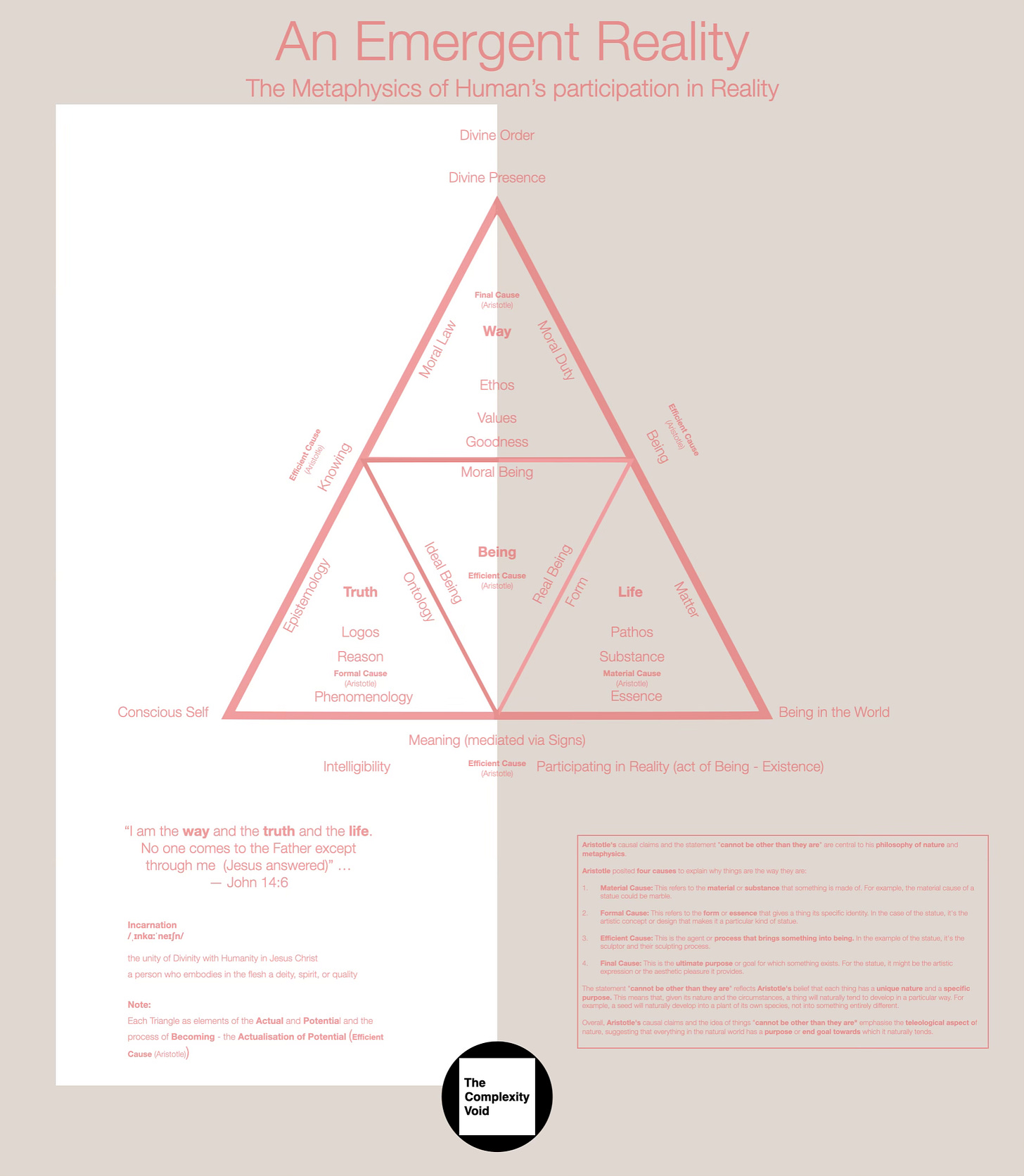The Third Epoque
From an Age of Being to an Age of Knowing to an Age of Meaning
Photo by Jakob Owens on Unsplash
“If we glance at themost important revolutions in history, we see at once that the greatest number of theseoriginated in the periodical revolutions of the human mind”…
— Wilhelm von Humboldt
“Let the mind be enlarged… to the grandeur of the mysteries, andnot the mysteries contracted to the narrowness of the mind”…
— Francis Bacon
How can we possibly understand the current moment in the history of Western Civilisation's Intellectual Thought that integrates Christian Theology, Ancient Greek Philosophy and Metaphysics? [LINK]
Is the current liminal period reflective of the unfinished nature of the Enlightenment Project? [LINK]
The dawn of a Third Epoque for Conscious Man’s understanding of the triadic intellectual scaffolding of Western Civilisation [LINK].
A transition that reflects a profound shift (i.e. the dawn of a Third Epoque) in Conscious Man’s understanding of the intelligibility of Reality as follows:
Age of Being - First Epoque: Ancient Greece and early to mid (e.g. Scholastics) Judeo-Christianity - God’s Creation
Core Question: What exists?
Metaphysical Orientation: Being participates in Divine Being (Metaphysics is the study of Being - the Science of Reality).
Ontological Foundation - The question of Being, Primacy of Existence (Creator (Necessary Being of God) and Created (Contingent Being of Man)) and Divine Order (Christian Theology, Plato, Aristotle).
Birth of Philosophy - Inquiry into what it means to be? (Parmenides). The intelligibility of the Cosmos and Divine Order.
Birth of Metaphysics - Study of Being (Science of Reality) (Aristotle).
Christian Trinity, including the notion of Incarnation (the Unity of Divinity with Humanity through Jesus Christ). Being is grounded in the Creator (God). Creation derives its intelligibility through participation in Divine Being. The combination of Reason and Faith enables a Human Being to know the Divine Order.
Christian Platonism - Normative Science (Truth, Aesthetics (Beauty), Ethics (Justice) - The Good (Plato)).
Ontological Categories (What can exist?) - Aristotle.
Modal Logic (Ontological grounding of thought) (Aristotle), Square of Opposition and Aristotelian Logic - Deductive Reason/Syllogisms (Aristotle).
Four Causes (Nature) - Aristotle.
Univocity of Being - Duns Scotus (Scholastics - Middle Ages).
Age of Knowing ( Age of Reason, Logic and Scientific Inquiry ) - Second Epoque: European Enlightenment - Human Creation: Science & Technology
Core Question: How do we know?
Refer - [LINK] - Augustine’s Trinity
Metaphysical Orientation: Mind represents the World through Concepts, Laws and Reason (Logic is the Study of Thought).
Primacy of Human Consciousness (e.g. Descartes’ res Cogitans - grounds certainty in the Perceiving Subject) and Primacy of Man (e.g. Theology of Marxism (ideology) ). The formation of the Conscious Self (i.e. the Liberated Individual).
Divine orientation of the ultimate source of Being (Creation) recedes. A reorientation towards Rational Conscious Man (e.g. Temples of Reason and Cult of Reason). The conditions of the possible experience (Kant) become the primary focus of Modern Philosophy.
Cartesianism (Descartes) ( ideology). The World becomes objectified and Reality becomes reconstructed through Abstract Reasoning and the Scientific Method.
Cartesian Dualism (res Cogitans and res Extensa - Substance Dualism) (Descartes) ( ideology).
Human Beings’ knowledge becomes creative, world-shaping and constructive (e.g. Hegel’s Second Nature). The combination of Science and Technology provides the catalyst for the transformation (e.g. Marx - Social Construction of Reality).
Dialectical Materialism ( ideology) that combines Idealism with Materialism, Reflexivity & Praxis becomes the methodology for Human transformation (i.e. given endemic Marxism).
Scientific Method combining British Empiricism with French Rationalism (Bacon).
Inductive Reasoning (Bacon).
Epistemological Categories (Kant).
Mental Structure Consciousness (Gebser) ( ideology).
Absolute Idealism (Hegel) ( ideology).
Materialism (Marx) ( ideology).
Sociologism - Reality as a Social Construct (Marx) ( ideology).
Boolean Logic (Epistemological grounding of thought) (Boole).
Classical Computation (Epistemological Origin - Abstract Symbols) (Babbage, Lovelace, Turing).
Universality of Reason (Kant).
Although the Primacy of Epistemology and the mathematisation of Science lead to a profound transformation of the World, it also eventually leads to an increasing alienation through the embracement of a Philosophy of Mechanisation grounded in Cartesian Abstraction rather than Being (e.g. the Theology of Marxism is inherently anti-Human, given it is a power-directed system of thought grounded in the Primacy of Man).
Age of Meaning - Third Epoque: Semiotics emerges in Europe and America in the late 19th & early 20th Century - Relationship between Divine Order & God’s Creation and Human Understanding & Creation - Conscious Man’s phenomenological relationships of the whole (Peirce) grounded in the relationship of this Being (Dasein) to Being (Sein) (Heidegger) and mediated via Signs (Peirce)
Core Question: What is the meaning of what exists, and how do we know?
Metaphysical Orientation: Phenomenological relational synthesis of Being and Knowing through Open Inquiry in the World (act of Being - this Being’s relationship to Being (Heidegger) and Semiotic Triadic (Peirce)) through an interpretative act mediated via signs. (Semiotics is the Study of Signs Meaning).
Consciousness is rediscovered not as an isolated subject but as relational (e.g. Husserl - Intentional Consciousness, Peirce - Triadic Semiosis, Heidegger - this Being (Dasein) and Being (Sein)).
Dyadic European Structuralist Semiotics (Signifier - Signified) (Saussure) (ideology).
Triadic Semiotics - Interpretant, Representamen, Object (Peirce). The oppositions of classical metaphysics (Being) and modern epistemology (Knowing) are reconciled via Meaning — the relational synthesis of sign, object, and interpretant (Peirce), or of Dasein and Sein (Heidegger).
Pragmatic Maxim (Normative Meaning - Coupling abstract concept & practical effects) (Peirce).
Triadic of Reason (Abduction (Peirce), Induction (Bacon) and Deduction (Aristotle) grounded in three phenomenological modes of Being (Firstness, Secondness, Thirdness (Peirce)) and three modes of Human Consciousness (Primisense, Altersense, Medisense (Peirce)).
Conscious Man not only participates in Reality (via act of Being), he also engages in the act of Co-Creation via emergence (i.e. Ontological (Being), Epistemological (Knowing), Phenomenological (Meaning)) through both discovering and disclosing the intelligibility of Being. Man is entangled in Reality rather than simply being the autonomous subject of Modernity.
Abductive Reasoning (Peirce).
Property Dualism (Conscious Self and Being - Rosmini) - Conscious Man participates in Being - Intentional Consciousness (Husserl).
Phenomenological Categories and modes of Being (Firstness, Secondness, Thirdness) (Peirce.
Consciousness (Primisense, Altersense, Medisense) (Peirce).
Monism - Physical & Metaphysical (Peirce) (note in contrast to Spinoza’s Substance Monism and Hegel’s Absolute Idea Monism).
Symbolic Unity of Things (Coleridge) - Participation in Truth - Connects particular with universal.
Unity of this Being (Real Being, Ideal Being, Moral Being) (Rosmini).
Semiotic (Peirce) Metaxic (Voegelin) nature of Human Being.
Integrated Consciousness (Gebser).
Intentional Consciousness (Husserl).
Dasein (Heidegger).
The phenomenological, epistemological, and ontological traditions converge to form a metaphysics of semiotic relations, where the human intellect participates in the unfolding of Being, but is also consciously reflexively aware of his own interpretive mediation.
Quantum Computing (Ontological Origin - Physical States).








